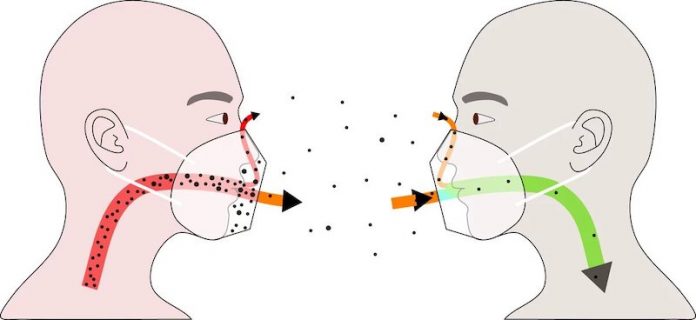
Three meters are not enough to ensure protection.
Even at that distance, it takes less than five minutes for an unvaccinated person standing in the breath of a person with COVID-19 to become infected with almost 100 percent certainty. That’s the bad news.
The good news is that if both are wearing well-fitting medical or, even better, FFP2 masks, the risk drops dramatically.
In a new study from Max Planck Institute, researchers examined to what extent masks protect under which wearing conditions.
In the process, they determined the maximum risk of infection for numerous situations and considered several factors that have not been included in similar studies to date.
The team was surprised at how great the risk of infection with the coronavirus is.
As high as the risk of infection is without mouth-nose protection, medical or FFP2 masks protect effectively.
The study confirms that FFP2 or KN95 masks are particularly effective in filtering infectious particles from the air breathed—especially if they are as tightly sealed as possible at the face.
If both the infected and the non-infected person wear well-fitting FFP2 masks, the maximum risk of infection after 20 minutes is hardly more than one per thousand, even at the shortest distance.
If their masks fit poorly, the probability of infection increases to about 4%.
If both wear well-fitting medical masks, the virus is likely to be transmitted within 20 minutes with a maximum probability of 10%.
The study also confirms the intuitive assumption that for effective protection against infection, in particular, the infected person should wear a mask that filters as well as possible and fits tightly to the face.
The infection probabilities determined by the Max Planck team indicate the upper limit of the risk in each case.
The detailed analysis showed that tight-fitting FFP2 masks provide 75 times better protection compared to well-fitting surgical masks and that the way a mask is worn makes a huge difference.
But even medical masks strongly reduce the risk of infection compared to a situation without any mouth-nose protection at all.
That’s why it’s so important for people to wear a mask during the pandemic. The results show once again that mask-wearing in schools and also in general is a very good idea.
If you care about COVID, please read studies about why smokers have a lower risk of COVID-19, and findings of this drug that could block multiple COVID-19 variants.
For more information about COVID infection, please see recent studies about this stuff that adds fuel to COVID-19 inflammation, blood clots, and results showing that the nose shows why some people get severe COVID-19.
The study is published in the Proceedings of the National Academy of Sciences. One author of the study is Eberhard Bodenschatz.
Copyright © 2021 Knowridge Science Report. All rights reserved.



